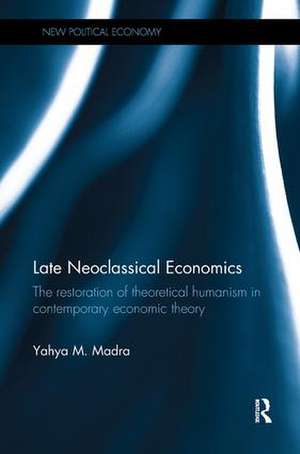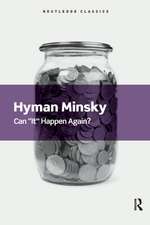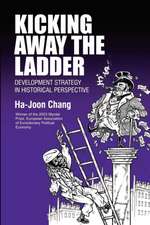Late Neoclassical Economics: The restoration of theoretical humanism in contemporary economic theory: New Political Economy
Autor Yahya M. Madraen Limba Engleză Paperback – 27 apr 2018
Late Neoclassical Economics: The Restoration of Theoretical Humanism in Contemporary Economic Theory draws on the work of Louis Althusser, Michel Foucault and the Amherst School, to construct the concept of a self-transparent and self-conscious human subject (Homo economicus) as the theoretical humanist core of the neoclassical tradition. Instead of identifying the emergent heterogeneity as a break from neoclassicism, this book offers a careful genealogy of many of the new concepts and approaches - including evolutionary game theory, experimental economics and behavioural economics - and reads their elaboration as part of the restoration of the theoretical humanist core of the tradition. ‘Late neoclassical economics’ is therefore characterized as a collection of diverse approaches which have emerged in response to the drift towards structuralism.
This book is suitable for those who study political economy, history of economic thought and philosophy of economics. The arguments put forward in this text will also resonate with anyone who is interested in the fate of the neoclassical tradition and the future of economic theory.
| Toate formatele și edițiile | Preț | Express |
|---|---|---|
| Paperback (1) | 278.84 lei 6-8 săpt. | |
| Taylor & Francis – 27 apr 2018 | 278.84 lei 6-8 săpt. | |
| Hardback (1) | 700.75 lei 6-8 săpt. | |
| Taylor & Francis – 28 iun 2016 | 700.75 lei 6-8 săpt. |
Din seria New Political Economy
-
 Preț: 429.44 lei
Preț: 429.44 lei - 18%
 Preț: 145.24 lei
Preț: 145.24 lei -
 Preț: 438.14 lei
Preț: 438.14 lei -
 Preț: 169.79 lei
Preț: 169.79 lei -
 Preț: 442.89 lei
Preț: 442.89 lei -
 Preț: 210.70 lei
Preț: 210.70 lei - 16%
 Preț: 247.87 lei
Preț: 247.87 lei -
 Preț: 416.12 lei
Preț: 416.12 lei -
 Preț: 194.67 lei
Preț: 194.67 lei -
 Preț: 466.45 lei
Preț: 466.45 lei -
 Preț: 463.58 lei
Preț: 463.58 lei - 24%
 Preț: 323.17 lei
Preț: 323.17 lei -
 Preț: 277.69 lei
Preț: 277.69 lei -
 Preț: 367.08 lei
Preț: 367.08 lei -
 Preț: 411.98 lei
Preț: 411.98 lei - 18%
 Preț: 1000.27 lei
Preț: 1000.27 lei -
 Preț: 194.38 lei
Preț: 194.38 lei -
 Preț: 431.73 lei
Preț: 431.73 lei -
 Preț: 277.87 lei
Preț: 277.87 lei -
 Preț: 387.83 lei
Preț: 387.83 lei
Preț: 278.84 lei
Nou
Puncte Express: 418
Preț estimativ în valută:
53.36€ • 57.06$ • 44.49£
53.36€ • 57.06$ • 44.49£
Carte tipărită la comandă
Livrare economică 17 aprilie-01 mai
Preluare comenzi: 021 569.72.76
Specificații
ISBN-13: 9781138599345
ISBN-10: 1138599344
Pagini: 218
Ilustrații: 5 Tables, black and white; 1 Line drawings, black and white; 1 Illustrations, black and white
Dimensiuni: 156 x 234 x 22 mm
Greutate: 0.31 kg
Ediția:1
Editura: Taylor & Francis
Colecția Routledge
Seria New Political Economy
Locul publicării:Oxford, United Kingdom
ISBN-10: 1138599344
Pagini: 218
Ilustrații: 5 Tables, black and white; 1 Line drawings, black and white; 1 Illustrations, black and white
Dimensiuni: 156 x 234 x 22 mm
Greutate: 0.31 kg
Ediția:1
Editura: Taylor & Francis
Colecția Routledge
Seria New Political Economy
Locul publicării:Oxford, United Kingdom
Public țintă
Postgraduate and UndergraduateCuprins
Part 1: Introduction
Chapter 1: Introduction: Making Sense of an Emergent Heterogeneity
Chapter 2: Towards an anti-essentialist Marxian critique of theoretical humanism
Part 2: Neoclassical Economics: Under the Shadow of Structuralism
Chapter 3: Neoclassical Economics: Shedding "psychologism"
Chapter 4: Theoretical humanism in crisis: The case of Walrasian economics in the post-war period
Chapter 5: Theoretical humanism in the evolutionary mode: The case of the Chicago School in the post-war period.
Part 3: Late Neoclassical Economics: Restoration of Theoretical Humanism
Chapter 6: Breaking with Neoclassicism or Restoring Theoretical Humanism?
Chapter 7: Market Failures and Economic Institutions: Opening Black Boxes and Introducing Meta-Markets
Chapter 8: Motivational Diversity and Cognitive Limitations: Saving the human subject from its structuralist destitution
Chapter 9: Equilibrium and Efficiency: Searching for Social Reconciliation in Game Theoretic Contexts
Part 4: Conclusion
Chapter 10: Epilogue: The Real Divide in Economics
Chapter 1: Introduction: Making Sense of an Emergent Heterogeneity
Chapter 2: Towards an anti-essentialist Marxian critique of theoretical humanism
Part 2: Neoclassical Economics: Under the Shadow of Structuralism
Chapter 3: Neoclassical Economics: Shedding "psychologism"
Chapter 4: Theoretical humanism in crisis: The case of Walrasian economics in the post-war period
Chapter 5: Theoretical humanism in the evolutionary mode: The case of the Chicago School in the post-war period.
Part 3: Late Neoclassical Economics: Restoration of Theoretical Humanism
Chapter 6: Breaking with Neoclassicism or Restoring Theoretical Humanism?
Chapter 7: Market Failures and Economic Institutions: Opening Black Boxes and Introducing Meta-Markets
Chapter 8: Motivational Diversity and Cognitive Limitations: Saving the human subject from its structuralist destitution
Chapter 9: Equilibrium and Efficiency: Searching for Social Reconciliation in Game Theoretic Contexts
Part 4: Conclusion
Chapter 10: Epilogue: The Real Divide in Economics
Recenzii
'Late neoclassical economics may be more mature than neoclassical economics, but it is not different from neoclassical economics as it has been practiced before...Madra succeeds in presenting a very clear and concise thesis which is highly relevant and interesting. His argumentation is straightforward, convincing and precise. The leitmotiv of the investigation never gets lost.' - Thomas Domjahn, History of Economics Review
Descriere
This book draws on the work of Louis Althusser, Michel Foucault and the Amherst School, to construct the concept of a self-transparent and self-conscious human subject (Homo economicus) as the theoretical humanist core of the neoclassical tradition. Instead of identifying the emergent heterogeneity as a break from neoclassicism, this book offers a careful genealogy of many of the new concepts and approaches - including evolutionary game theory, experimental economics and behavioural economics - and reads their elaboration as part of the restoration of the theoretical humanist core of the tradition.
